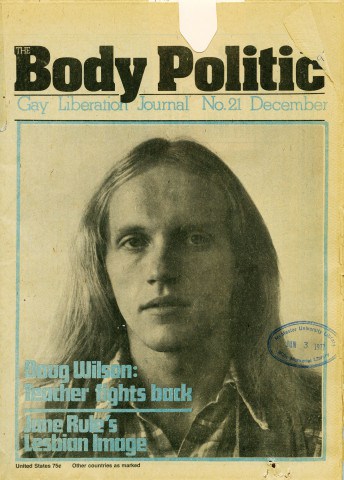Now taken for granted as a safe space, the University of Saskatchewan campus was once a place that academically and professionally penalized individuals for coming out. Doug Wilson changed that, however, and as a result, our lives on campus are better today.
Wilson was a graduate student and sessional lecturer in the College of Education in the mid 1970s. He was also heavily involved in the now-defunct Saskatoon Gay Community Centre — a predecessor to modern organizations like OUTSaskatoon, and one of only two dedicated gay community centres in Canada at the time.
In the fall of 1975, Wilson submitted a brief advertisement to the Sheaf to inquire about starting a gay club on campus. He used his name and his College of Education mailing address. Dean of education at the time, J.B. Kirkpatrick, did not hesitate before retaliating.
Kirkpatrick revoked Wilson’s eligibility to supervise teacher interns. As Wilson explained in the Sept. 30, 1975 issue of the Sheaf, Kirkpatrick’s decision was apparently a moral one and Wilson’s  “public involvement with the gay movement” was the justification behind it. The response from the university and surrounding community was swift.
“public involvement with the gay movement” was the justification behind it. The response from the university and surrounding community was swift.
The Committee to Defend Doug Wilson formed and wasted little time in filing a complaint with the Saskatchewan Human Rights Commission, which, sympathizing with Wilson, called for an inquiry. However, the Court of Queen’s Bench for Saskatchewan ultimately overturned the Commission’s decision.
In true hero fashion, an undiscouraged Wilson continued his fight for equality in Saskatoon and later in Toronto, campaigning as an activist for gay rights and later for issues surrounding HIV and AIDS.
Wilson died of an AIDS-related illness in 1992 at age 41. In 1995, the group Gays and Lesbians at the U of S established the Doug Wilson Award for gay rights activism in his honour.
Other groups continued Wilson’s crucial work to implement protective measures for gay and lesbian — and later still, everyone in the LGBTQ acronym — students, faculty and staff. Many current members of the university community have directly benefited from Wilson’s work, myself included.
I came out in the late 90s while attending a Catholic high school. Having heard that the U of S had something called the “LGB Centre” — now the more inclusive and all-encompassing Pride Centre — I skipped my Christian Ethics class and rode the bus to campus.
I was determined to check out the club. Tentative in my steps, I made my way through the tunnel from Place Riel to the upper Memorial Union Building, peered through the door of the LGB Centre and then ran, terrified, to take the bus home.
My mouth was dry and my heart palpitated, convinced that everybody knew my secret. It would take a few attempts before I had the courage required to set foot inside that warm, welcoming room.
That same year, I attended the presentation of the Doug Wilson Award for the first time. When I mentioned the award to my mom and my aunt — fellow College of Education alumni from Wilson’s era — they said something to the effect of, “Oh, that guy. He always had to make such a big deal about his gayness.”
Times have changed. Less than a decade after that conversation, my mom walked me down the aisle at my same-sex wedding.
In the late 1990s, it was still drastically more difficult than it is today. In my experience, religious groups and students in some of the more male-dominated colleges were particularly harsh and discriminatory.
Coming out in those days was still a big deal, but it was difficult and necessary. Labels seemed important. Claiming, owning and naming precisely who we were — “making a big deal about our gayness” — was a significant method of gaining visibility, recognition, respect and, ultimately, something approaching equality.
Today we are surrounded by safe spaces on campus. The Pride Centre thrives and we can come out to our professors, colleagues and fellow students without being penalized. Should anyone discriminate, we have tangible recourse.
I, for one, would like to express my thanks to the late, great Doug Wilson. As someone who can hold her head up when entering any room on campus, I’m grateful to the person who initiated that trajectory for all of us.
—
Patty Hails
Photo: University Library, Archives & Special Collections / Body Politic Dec 1975
Leave a Reply